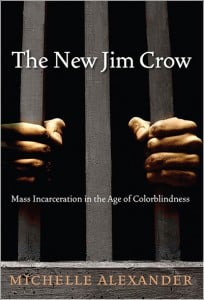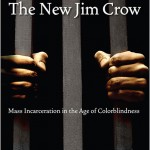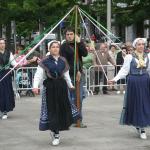As I wrote five weeks ago, I’m running a book group through my church, Valley and Mountain, to read The New Jim Crow: Mass Incarceration in the Age of Colorblindness by Michelle Alexander. (Find all the posts for this book group here. Feel free to use this guide in your church/community!)
Chapter six should be the chapter that tells us what to do about the horrific problem of mass incarceration of black men–right? Unfortunately, it does not. What it does do is ask important questions for us to consider as we move forward to solve this problem. Alexander brings up some important but difficult points, such as the idea that we shouldn’t try to be colorblind. Her goal is to stop social control of black men permanently, not simply to dismantle the current system.
How the meetings run:
A quick recap:
Each meeting, we’ll start with a welcome. Then, we’ll have a brief moment of silence. Next, we’ll take turns reading a short text (a Bible verse, poem, quote, or short reading) that somehow reflects our spirituality. Then I’ll read a relevant Bible passage or spiritual reading (for example, by a thinker like Cornel West) and share a short reflection on the text. We’ll discuss the discussion questions for the week, which I’ve pulled from various sources online. To close, we’ll have a prayer circle.
Week 6:
Intro
Our usual moment of silence, followed by sharing our spiritual texts.
Reflection
Next, we’ll read a short spiritual text. One of the members of my group sent around a link to Eula Biss’ “White Debt,” which crystallizes a lot of the ideas and troubles some of the white people in my group have brought up. I particularly like her discussion of guilt, which plays into Christian notions of good, evil, and redemption:
‘‘Evil’’ is how slaves describe their masters. In Nietzsche’s telling, Roman nobles called their way of life ‘‘good,’’ while their Jewish slaves called the same way of life ‘‘evil.’’ The invention of the concept of evil was, according to Nietzsche, a kind of power grab. It was an attempt by the powerless to undermine the powerful. More power to them, I think. But Nietzsche and I disagree on this, among other things. Like many white people, he regards guilt as a means of manipulation, a killjoy. Those who resent the powerful, he writes, use guilt to undermine their power and rob them of their pleasure in life. And this, I believe, is what makes guilt potentially redemptive.
Guilt is what makes a good life built on evil no longer good. I have a memory of the writer Sherman Alexie cautioning me against this way of thinking. I remember him saying, ‘‘White people do crazy [expletive] when they feel guilty.’’ That I can’t dispute. Guilty white people try to save other people who don’t want or need to be saved, they make grandiose, empty gestures, they sling blame, they police the speech of other white people and they dedicate themselves to the fruitless project of their own exoneration. But I’m not sure any of that is worse than what white people do in denial. Especially when that denial depends on a constant erasure of both the past and the present.
A guilty white person is usually imagined as someone made impotent by guilt, someone rendered powerless. But why not imagine guilt as a prod, a goad, an impetus to action? Isn’t guilt an essential cog in the machinery of the conscience?…
I’m…compelled by a freedom that would allow me to deserve what I have. Call it liberation, maybe. If debt can be repaid incrementally, resulting eventually in ownership, perhaps so can guilt.
And to give a bit more depth to this quote, here is the passage from Nietzsche, which comes from A Genealogy of Morals, that I believe Biss refers to:
The two antithetical values “good and bad,” “good and evil” have fought a terrible battle, a battle lasting thousands of years. And though undoubtedly the second of these values has long since succeeded in getting the upper hand, yet places are not wanting even now, where the struggle is continued with doubtful issue…
The symbol of this struggle…is called “Rome against Judea, Judea aganist Rome.”…Rome felt in the Jew something like the embodiment of anti-naturalness, its anti-podal monster, as it were; in Rome the Jew was looked upon as “convicted of hatred against all mankind;” and rightly so, in so far as we have a right to connect the welfare and future of mankind with the unconditional dominance of aristocratic, Roman values.
The feelings, on the other hand of the Jews against Rome?…
The Romans, we know, were the strong and the noble…the Jews on the contrary, were that priestly people of resentment…
Which of the two has gained the victory for the time being, Rome or Judea? But is there no doubt whatever? Let us but consider to whom today people bow in Rome as to the essence of all highest values–and not only in Rome, but almost over half the globe…
To three Jews…and one Jewess [Jesus, Peter, Paul, and Mary]…
This is very remarkable: Rome, beyond all doubt, did succumb.
Discussion Questions
I am using the questions from The New Jim Crow Study Guide, which you can download for free here.
For the last week, I’ll also review our goals (which you can find in the first week’s post) and ask the group if we met them. We’ll discuss action that we might take together or separately. I have a *lot* of ideas for this blog, which I hope to share with you in the coming weeks.














